by Jonathan Manafo | Sep 18, 2018 | Sunday Conversations
Let me ask you…who still has a home phone? Apparently, 1/3 of Canadians don’t have a home phone anymore. Most of us understand that something has shifted in the last number of years. Technology is one thing…but…also…people used to enjoy (or be at least be ok) getting calls, not so anymore. These days, when someone calls, we’re shocked. “Who’s calling me? Why would anyone call me?”
One of my favourite comedians does a routine on the difference between the doorbell ringing, let’s say 30 years ago,  to the doorbell ringing today. 30 years ago we were ok with someone coming to the door, we said, hey, I wonder who that is, let’s go see. Today, we’re shocked that someone would drop by, and before even checking to see who it is, we close all the lights and pretend that nobody is home. This is the same attitude we have with phone calls. What are we afraid of? That we might have to respond to something too quickly. If they text me or leave a voicemail, I can think about my response before giving them an answer.
to the doorbell ringing today. 30 years ago we were ok with someone coming to the door, we said, hey, I wonder who that is, let’s go see. Today, we’re shocked that someone would drop by, and before even checking to see who it is, we close all the lights and pretend that nobody is home. This is the same attitude we have with phone calls. What are we afraid of? That we might have to respond to something too quickly. If they text me or leave a voicemail, I can think about my response before giving them an answer.
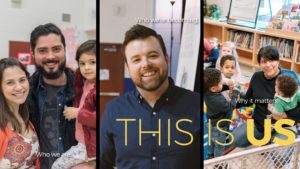
Over the next few weeks we’re going to dive into what it means to be us. THIS. IS. US. A series about who we are, who we’re becoming and why it matters. Our first stop on this journey? Calling. Why calling is an important part of what it means to follow Jesus, and why we simply must be aware and attentive to what Jesus is calling us to do and who he’s calling us to be. Here we go.
There’s an obvious difference between getting a (phone) call, and ‘calling’. Both require a response, but the implications are far different. Understanding our CALLING being much more important.
The word ‘called’ shows up 480x in the Bible (NIV) , and almost 800x in a topical sense. What do you think about when you hear the word ‘calling’? or ‘called’? There was an old joke about being ‘called’ to Africa. Someone would, with a deep voice say, ‘go to Africa’, and you’d say, ‘no Lord, not Africa’. Africa is a beautiful place, but it was a metaphor for something you’d never want God to ask of you.
For some people, when we think about calling, it invokes fear, for others it inspires adventure. If anything, calling should be connected to purpose. Biblically, it is something you are ‘called to be’ and ‘called to do’.
As you can imagine, there are many published lists of ways to identify your calling. From Christian writers, to self-help authors, to Oprah – people wanna help us figure out our calling.
Here are a few from a Forbes list…
– Ignore the future, deal with the present
– Say yes to odd opportunities
– Find a problem to solve
– Don’t follow someone else’s dream
– Ask the elderly for advice
– Spend time before you spend money
– Don’t confuse a job with your purpose
– Be authentically uncool
All good, right?
Calling is about What are you called to? Who are you called to? How you discover that calling?
Matthew 4…
18 As Jesus was walking beside the Sea of Galilee, he saw two brothers, Simon called Peter and his brother Andrew. They were casting a net into the lake, for they were fishermen. 19 “Come, follow me,” Jesus said, “and I will send you out to fish for people.” 20 At once they left their nets and followed him. 21 Going on from there, he saw two other brothers, James son of Zebedee and his brother John. They were in a boat with their father Zebedee, preparing their nets. Jesus called them, 22 and immediately they left the boat and their father and followed him.
If you were in Galilee today, they’d show you a boat that may have belonged to Andrew & Peter. It was found in an archeological dig one dry summer. It’s a reminder of what the disciples did (for a living), and what they left (to follow Jesus) They were making a modest living, selling things other people wanted – fish.
Why give it up? Well, Jesus was compelling. They’d heard about him and they just couldn’t say no. Callings are like that. You just know. Deep in your gut.
Why do it today? Why respond to wild and adventurous callings, or event more subtle and simple ones? JESUS.
“Christians everywhere regularly give up lifestyles & practices that look attractive, to maintain lives of honesty, integrity, faith, hope and love.”
Sometimes the calling is slow and faint, until we can’t ignore it any longer. Other times it’s more sudden and dramatic. We know this for sure: Jesus has a way of getting through to us.
What’s the call in Matthew 4? Follow me (physically, not just to hear or listen) & Fish for people instead of fish. Notice in this text that Peter is called by both his names, his old one and his new one. Which leads us to Matthew 16…
Jesus, in conversation with his disciples, asks them who they think he his. They give a few answers (some say this & that, John the Baptist, Elijah, Jeremiah), but Peter gets it right and says, “You are the Messiah, the son of the living God”. What follows is amazing… 17 Jesus replied, “Blessed are you, Simon son of Jonah, for this was not revealed to you by flesh and blood, but by my Father in heaven. 18 And I tell you that you are Peter, and on this rock I will build my church, and the gates of Hades (hell) will not overcome it. 19 I will give you the keys of the kingdom of heaven; whatever you bind on earth will be bound in heaven, and whatever you loose on earth will be loosed in heaven.”
After Peter affirms and tells Jesus who he is, Jesus turns around and tells Peter who he is. You Are…Peter…Rock…one of the broken, yet called people that I will build my church on. You can’t see it, but this church you’ll be building will be so strong and impactful, not even the gates of hell can knock it down. And I will give you the keys…the tools…to fulfill this calling in you’re your life.
So Peter, who do you say that I am? MESSIAH. And Jesus, who do you say that I am? Who are you calling me to be? ROCK/PETER – a new name for a new calling.
2 stories. 4 disciples. They discover who they are, who they are going to become. And why it mattered.
Here’s why it matters to us: We want to know what we’re called to & who we’re called to…(sometimes obvious and sometimes not so obvious) Calling defines us – our Calling identifies our impact. In every calling in biblical narrative, no one knew what would come, but they did know the first step – follow Jesus – follow this calling. Becoming a follower of Jesus meant that CALLING becomes more important than anything…as it directs and defines all the steps of your life. (big and small)
We can’t walk through all 480x we read ‘called’ in the bible. But here are a few important places:
2 Chr 7 who (you) are called by name
Gen 1 God ‘called’ the man (adam)
Gen 17 you’re now called Abraham (new name)
Rom 1 you’re called to belong to Jesus
Rom 8 called according to God’s purpose
Rom 9 called to be children of God
1 Cor 1 called to be his holy people
1 Cor 1 called into fellowship with Jesus
1 Cor 7 called to live in peace
Gal 5 called to be free
Eph 4 called to one hope
1 Pet 2 called out of darkness and into light
THIS IS US. A Called People. A Called Community.
– – – – – – – – – – –
We don’t know where the call will lead us, but we are compelled to answer, because Jesus is the one calling.
God, in his mercy, reveals things little by little. We never know the impact of our calling, but we somehow know it’s worth it.
We don’t have to be perfect to respond, simply available.
Whatever our calling is, whatever Jesus is calling us to do, one thing is for sure, our calling calls attention to whatever new thing God is doing, and we’re part of God’s plan to help others see it.
? Will you answer the phone (the call) ?
by Jonathan Manafo | Sep 11, 2018 | Sunday Conversations
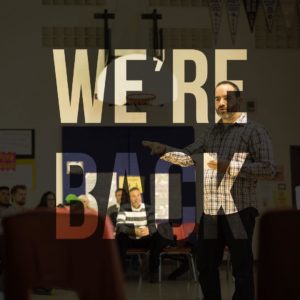 Over the years I’ve had some episodes with my back. Some really bad, others just minimal. The last one (a few years ago) was the worst one. And it forced me to start doing something regularly that I never really did before. STRETCH… (bet you wish I could display a few for you? nope. you don’t!)
Over the years I’ve had some episodes with my back. Some really bad, others just minimal. The last one (a few years ago) was the worst one. And it forced me to start doing something regularly that I never really did before. STRETCH… (bet you wish I could display a few for you? nope. you don’t!)
Labour day weekend is to our year, like stretching is to an athlete. Before an event, a race, a game, a match, what do athletes do? Warm up. Stretch. Get the blood flowing. Why – Because they want to be able to extend themselves to their absolute limits without holding back!
After the summer, you’ve been out of commission for a bit, thinking about all the vacation you can take, and hopefully you did, rest, and vacation. After labour day though, you feel like you gotta be on again, so what do you do, you prep yourself, you warm up…Kids go to bed earlier…Parents go to bed earlier…You mentally get ready. All this so you can perform to the best of your abilities come go time.
We’ve been on a journey as a church community for a while now. This is our 7th September (Library sessions). A few things I find amazing? The people who have joined us along the way – the people who’ve decided to follow Jesus with their hearts, their lives, their everything – the people who’ve grown so much in their faith, their impact, their purpose. Most amazing is how much we’ve been stretched along the way. Spiritually, Emotionally, in our faith, in our neighbourhoods, in our relationships.
This year we wanna see more of the same…and we also wanna see whatever else God has for us. Whatever else is an important word in our prayers. God, what else do you have for me?
Where does God work in us? Where does he work through is? These two places…
When we GATHER
– Sundays (worship, reunion, spiritual formation)
– Small(er) groups (community, friendship, growth)
– Volunteering/Contribution (we need what everyone has to offer)
When we SCATTER
– What we learn here is to be practiced out there
– What happened in our hearts when we gather, needs to come out of our hearts when we scatter
In our INTER-MISSION
– Sunday we are between mission assignments
– Sunday is a break from the world, from the rat race, from the business.
Through our OUT-ER-MISSION
– so we can get back to it
– so we can live on mission
– collectively (R4H, Woodcrest PS)
– individually (home, neighbourhood, work, school)
Now…let’s get back to stretching…will you stretch with me? where you are? where you’re reading this? No? Well then, read this story with me from Mark 3 instead? Let’s see what this whole stretching thing is all about…
“Another time Jesus went into the synagogue, and a man with a shrivelled hand was there. 2 Some of them were looking for a reason to accuse Jesus, so they watched him closely to see if he would heal him on the Sabbath. 3 Jesus said to the man with the shrivelled hand, “Stand up in front of everyone.” 4 Then Jesus asked them, “Which is lawful on the Sabbath: to do good or to do evil, to save life or to kill?” But they remained silent. 5 He looked around at them in anger and, deeply distressed at their stubborn hearts, said to the man, “Stretch out your hand.” He stretched it out, and his hand was completely restored. 6 Then the Pharisees went out and began to plot with the Herodians how they might kill Jesus.”
A few things going on in this story…
– Another time (Jesus is doing what he has been doing, going into a gathering of people to teach or simply be present)
– A man with a physical issue was already there
– He’s being watched closely by religious people…
o Will he or won’t he heal on the Sabbath?
o This is a big question…Jesus liked to break religious rules!
– This bugs Jesus’
– He tells the man to stand up & stretch out his hand
– The man’s hand is restored
A few questions we have to ask ourselves…
– What rules/traditions/legalistic laws are holding us back?
– What part of me do I have to stretch out?
– Is their something in me that’s not right, that’s just in a state it shouldn’t be in, like this man’s hand? What am I going to do about it?
Stretching does three things:
– Physically, it loosens up what is stiff & tight so you can perform the activities that are before you that day…
– Emotionally, it pushes you to move out of your comfort zone and extend yourself…
– Spiritually, it reflects your dependence on Jesus, and how he wants to both make you well, and use your hands to do good…
TAKE HOME:
The questions we want to ask ourselves are simple and profound…
Are you willing to stretch out your hand to God?
– individually
– as a community
Are you willing to allow God to stretch you?
(Take a few minutes to reread the story, and ask yourselves these questions as you pray)
by Jonathan Manafo | Jul 31, 2018 | Sunday Conversations
This past weekend we closed out July by introducing you to our church@home teaching series.
For the next 4 weeks we’ll be diving into Bob Goff’s small group material, based on his book, Everybody Always.

In classic Bob Goff style, he shared stories about how God uses us to love others in the same, big, boundless, and audacious way that God loves us.
We’re invited and challenged to love our neighbour as our self. Even though we can do this in simple ways, many of us find it difficult and even scary. Bob reminded us, in this first video, that God often uses these words when challenging us to love and serve, “Do not be afraid”. We read them in both the Old & New Testament.
We segued from Bob’s talk and turned our attention to the communion table. What a perfect way to end July – around a table with wine and bread – reminding us of how much Jesus loves us.
In all this talk of loving our neighbours, know that Jesus calls us his neighbour, and we are his friends, and he is the best example of what it means to love our neighbour as ourself, because that is the way he loves us.
Read John 15:12-17 this week as you think about this.
– – – – – – – –
Our 60 day summer challenge is in full swing. You still have time to participate in the remaining 30 days.
 – read one gospel book
– read one gospel book
(i.e. Mark works well by reading 4 chapters each week in August)
– read one short NT book
(i.e. James, Philippians, Jude)
– start each week with a Psalm
(i.e. 1, 4, 8, 13, 15, 23, 46, 51, 139)
– pray before and after each reading
– be open to loving and serving as God leads you
Church@Home is our August rhythm/routine. Make sure to check out the simple gatherings we’re hosting and get to a bunch of them this month. There is a Sunday option (Second Cup, North Whitby, 10-11am) and a mid-week home gathering (Wednesday from 7:30-9pm). More details on our events page and social media links.
by Jonathan Manafo | Jul 31, 2018 | Sunday Conversations
 Our Third & Final movie of this July series is Black Panther…
Our Third & Final movie of this July series is Black Panther…
- This is a Marvel Movie…a Superhero Movie.
- Which means we risk blocking out an audience that isn’t into these kinds of movies so much…sorry.
- Black Panther was one of the most anticipated movies in a long time.
- They grossed more than any Marvel movie (1.3 billion)
- 1st in Superhero, 3rd in Domestic, 2nd Disney
- Why? Why all the hype? Why would we dabble with this story on a Sunday morning? What kind of connection could this possibly have with Faith, Hope & Truth.
- Let’s see. But first, a bit of the story!
STORY:
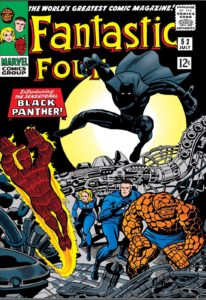 Black Panther, the character, originated in 1966, in a Marvel comic featuring the Fantastic 4. It was issue #52.
Black Panther, the character, originated in 1966, in a Marvel comic featuring the Fantastic 4. It was issue #52.
Think about it. Why 1966? These are the years of MLK, John Lewis and the civil rights movement. This was Marvel’s way to speak into the climate of the day. (on purpose or by accident). One might say that it’s just animation, or just a comic book character. Others might say it was a very clever way to invite a new audience to Marvel and speak into a broken culture in some helpful way.
The story is about a people in a third world African country called, Wakanda.
To the world, they are considered impoverished, but that is only their front. Beneath the surface, they are an advanced society in resource, technology, and more. This is all because of something called Vibranium.
They recognized what they discovered, and how their way of life contrasts the rest of the world. So what did they do? Hide it. Conceal it. Protect it.
Some background is given. King T’Chaka’s brother was sent to the US as a spy. He didn’t do too well. Instead of observing and fitting in, he was influenced by the ways of “the world”. He sold Vibranium to someone who wanted to use it for ill. King T’Chaka comes to visit, confronts him, and in the process we discover that another spy was planted, this causes the King’s brother to react, and in this conflict, the brother is killed. Sad. For him…and his son that is left behind in poor Oakland neighbourhood.
We fast forward. King T’Chaka, is now passed, due to an accident at a United Nations meeting (Marvel story). T’Challa, his son, must now become the new King of this nation.
We learn that T’Challa is a good man; a peaceful man. He is opposite of the ways of the world. He doesn’t want to wage war on others, and is able to change and see things differently than even his ancestors did.
There is a beautiful exchange in the movie between T’Challa & his father. “You’re a good man, with a good heart, and it’s hard for a good man to be King”
- this reminds me so much of CS Lewis & Narnia. Little Lucy in that story asks if Aslan is safe. And the beaver responds by saying, “Safe?” said Mr Beaver …”Who said anything about safe? ‘Course he isn’t safe. But he’s good. He’s the King, I tell you.”
- I love how this story throws us into questions of leadership and integrity. Can good people be effective leaders? YES.
The villain in this movie is Erik (or Killmonger), the boy left behind by the King T’Chaka. His circumstance, his suffering, his past, drives him to revenge. This is something both T’Challa and the people have to deal with as it forces them to face a reality they don’t like – their former King, even though his intentions were good, made a bad decision – he chose protection over care – he chose to leave his nephew to protect his people. T’Challa must be different.
- this is important to think about
- Can we move beyond the sins of our fathers/mothers?
- “You can’t let the mistakes of your father define you” (Nakia)
- Can we, respectfully acknowledge, that even though we love and appreciate who’s gone before us, we can be better.
- Perhaps some of our own stories resemble this…
The dilemma or problem to be solved in Black Panther is this:
- Your prodigal son/nephew has come home with a vengeance
- He fights for the throne
- Your good King is dethroned
- Will you continue to fight within or will you come together to be better?
- Erik, as new king, wants Wakanda to respond to his enemy’s in the same ways his enemies treated him. T’Challa says to him at one point, “You want us to become just like the people you hate”
I don’t wanna give too much of the story away, plus there’s too much in this story line to share in this format. I will say that this story ends so well.
- The King decides to purchase the buildings his uncle and cousin lived in, in Oakland, and restores the community.
- They will build the first Wakanda International Outreach Centre focusing on social outreach and sciences and technology.
- It’s like they went back to where their worst mistake was made and redeemed it…moved forward from it.
- Then, speaking at the United Nations, they say these remarkable words, “For the first time in history, we in Wakanda will be sharing our resources with the outside world. We can no longer watch from the shadows, but be an example of how we, brothers & sister on this earth should treat each other. The wise build bridges, the foolish build barriers. We must find a way to look after one another.”
INSIGHTS/APPLICATION/SCRIPTURE: (Faith, Hope, Truth)
Black Panther deals with many ISM’s (Agism, Racism, Feminism, Elitism, etc)
- this story highlights equality in all respects
- Women
- The women in the this movie are the heros
- They are strong, intelligent, confident, and leaders
- Young & Old come together. Wisdom & Work shared by all.
- Joel 2 definitely comes to mind here…
- “Then, after doing all those things,
I will pour out my Spirit upon all people.
Your sons and daughters will prophesy.
Your old men will dream dreams,
and your young men will see visions.
In those days I will pour out my Spirit
even on servants—men and women alike.
- 1 Timothy 4 as well, “Don’t let anyone think less of you because you are young. Be an example to all believers in what you say, in the way you live, in your love, your faith, and your purity.”
- “Elders” in the scripture is given to those who are not only of age, but of ilk, those who lead by example
- Colour is strength, not weakness
- Where you live really does effect your world view. We of course can be better than this.
- This movie breaks barriers…in so many ways. A BLACK movie…unapologetically…as it should be.
What do we do with what we’ve been entrusted with?
- Fight the temptation to protect what you have, and instead share what you’ve been given.
- Perspective
- It’s yours to keep
- It’s yours to use
- It’s yours to share
- The Wakanda people came to the conclusion that sharing what they have is the best way to live and to lead.
- In Luke 12 we read, “From everyone who has been given much, much will be demanded; and from the one who has been entrusted with much, much more will be asked.”
- There are countless other places in scripture where we are called to be generous…don’t miss out on the gift of generosity.
- Idolatry is a potential problem in this story as well. They’ve come to trust in, worship if you will, Verbranium. It’s subtle, but it’s there. Remember Jesus’ words, “you can’t worship both God & money”. These are fitting words in this context.
3 ethics reflected in this story
- T’Challa / King – justice/goodness
- Killmonger / villain – revenge/hurt
- Nakia – compassion/heart
The viewer is faced with a decision…what ethic will you live by?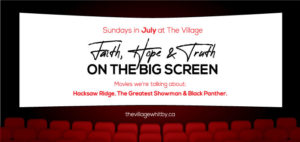
This concludes our series in movies this year. Hope you enjoyed it. Each movie had something different to offer. Thank you for engaging with us and allowing us to take a different approach this month. Also, a big thanks to Wes Peel, Cheryl Romeril, and Renz Laserna, for participating in each of these conversations. They added so much to this series.
Peace & Love & Recycle!!!
by Jonathan Manafo | Jul 17, 2018 | Sunday Conversations
TRAILER : The Greatest Showman…
Inspired by the story of PT Barnum
Situated in the mid 1800’s…
The story is a recapturing of how the Circus came to be. In actuality, it’s the story that leads to the Ringling Bros. and Barnum & Bailey Circus, which ran uninterrupted for 146 years until it’s closing last year.
 This movie starts with a HUGE song, “This is the greatest show”. Calling us to the watch and participate in the greatest show, “like it’s everything you ever wanted and needed.”
This movie starts with a HUGE song, “This is the greatest show”. Calling us to the watch and participate in the greatest show, “like it’s everything you ever wanted and needed.”
This is partly a true invite, and also a way to sidetrack the viewer, you, and me, from initially identifying what the greatest show actually is.
Before we say anything else, know that this movie is “inspired” by the story of PT Barnum and events around his life. It’s not a true life description or telling. There is much liberty taken in this movie. But that’s ok. And here’s why. The writers are using the inspiration of Barnum’s life to tell us some things about dreams, ambition, values, community, humanity, and much more.
Barnum came from very little. His Father was a tailor who worked at wealthy families home, one home being the home of Charity, a little girl who Barnum became best friends with, and eventually married.
One of the main songs running through the film is “A million dreams”. Very important, as Barnum thinks the world should be better.
- His Father died when he was young
- He had to do what he could to survive
- He was determined to somehow move from his situation to a better one.
- “A million dreams for the world we’re going to make”
As a young adult, Barnum goes to Charity’s house to ask for her hand in marriage. Her Father let’s her go, but not without warning Barnum… “Sooner or Later she’ll tire of your life, of having nothing, and she’ll be back.” This is a prominent theme in the movie, rich vs poor, elite vs peasant, gifted vs unique…and how the world needs to change in how they separate & divide people. This also plays out in a scene with Phillip Carlyle & Anne Wheeler.
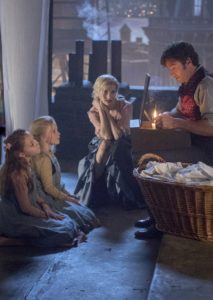
Fast forward to Barnum & Charity being married with two young girls of their own. Barmun’s work company goes bankrupt. As bad as this is, it inspires and challenges Barnum to dream again. And dream he does.
He begins to envision a place where people’s uniqueness is celebrated, a place to show off our differences and our gifts. This venture/vision, even though it eventually takes off, is criticized and protested. One of the words used to criticize this show was ‘CIRCUS’. Barnum loved it, and used it in his new title of the show.
The interesting thing is that even though Barnum believed in the uniqueness of everyone, he was tempted to be like everyone else and to be loved by everyone else. This led him away from the circus and his family for a short time to run a tour for an opera singer. He was fooled to think that prooving himself to the elite and wealthy would bring him happiness.
Barnum was beginning to lose his way, but his family, his circus community, and I think, his convictions, helped him find it again.
Something tragic happens to his building. A fire. Horrible. Like most traggic things in life, they lead to questions that bring perspective and purpose.
A few post fire conversations were important…
- While sitting on the steps with the reporter who mostly wrote critical reviews, we hear this conversation, “I never liked your show, but I always thought the people did. Putting folks of all kinds, colours, shapes and sizes on stage with you, presenting them as equals…another critic may have called it a celebration of humanity.”
- The circus crew met Barnum at the bar. He tells them there’s no money to be paid, not sure why they’re there. They respond with…“Don’t you get it Barnum? Our own mothers were ashamed of us. They hid us our whole lives. Then you pulled us out of the shadows. Maybe you were a fraud. And you made a buck. But you gave us a real family. You gave us a home. We want our home back.”
- Beach scene with Charity as Barnum goes back to her: (B) “I wanted to be more than I was.” (C) “I never wanted anything than the man I fell in love with”
- why do we feel we have to prove ourselves to others…God loves us, accepts us, calls us, sends us…this is a key gospel theme.
- Carlyle says to Barnum “Before I met you I had a job, an inheritance, and an invitation to every party in town. Now all that’s gone. All that’s left is friendship, love, and a work that I adore.” You brought joy into my life.
The fire actually did lead to an outstanding idea. “We don’t need a building…we can house this in a tent”
The movie ends with the song, This is the greatest show, but by then we realize that the greatest show isn’t the show you put on for others, it’s the relationships you build with others along with way. It’s the inspiration we give to others, the love, the encouragement, the care we give and share with those around us, in our community. In the final minutes we see Barnum walking off stage, handing his baton & hat to Carlyle (literally and symbolically) then goes to watch his greatest show, his kids ballet recital.
INSIGHTS/APPLICATION/SCRIPTURE: (Faith, Hope, Truth)
Are you the person you want to be or have you gotten caught up in someone else’s aspirations and false hopes?
- this movie is about someone with wonderful and pure intentions who’s lost his way…and fortunately found it again.
- Matthew 16 seems to come to mind again (like Hacksaw). Don’t try and gain the world and lose your soul (lose you) in the process…
Do we appreciate others, for who they are, not who we want them to be? Do we see the humanity, the image of God, that connects all of us.
- This story represents the beauty of the misfits (Peter Dewit’s FB comments)
- Why is it so hard for us to accept others, when in reality we all live with insecurities that challenge our sense of belonging?
- Isaiah 43:1 “I have called you by name, you are mine”
- James 2:2-9, Suppose a man comes into your meeting wearing a gold ring and fine clothes, and a poor man in filthy old clothes also comes in. If you show special attention to the man wearing fine clothes and say, “Here’s a good seat for you,” but say to the poor man, “You stand there” or “Sit on the floor by my feet,” have you not discriminated among yourselves and become judges with evil thoughts? Listen, my dear brothers and sisters: Has not God chosen those who are poor in the eyes of the world to be rich in faith and to inherit the kingdom he promised those who love him?… If you really keep the royal law found in Scripture, “Love your neighbor as yourself,” you are doing right. But if you show favoritism, you sin
What’s your sense of home?
Does your life project a sense of home onto others? Do they feel at home when you’re around?
- Luke 15. Prodigal comes home.
- You will be known for how you love others – for how you make others feel at home.
Psalm 84:2-4
My soul yearns, even faints,
for the courts of the Lord;
my heart and my flesh cry out
for the living God.
Even the sparrow has found a home,
and the swallow a nest for herself,
where she may have her young—
a place near your altar,
Lord Almighty, my King and my God.
Blessed are those who dwell in your house;
they are ever praising you.
Cheryl Romeril added these amazing insights:
Who is great? In who’s eyes? Such an important question to ask ourselves.
Early in the movie we were shown that the poor are often the most generous (Phineas was trying to steal food and the disfigured woman gave him an apple while the vendor in the market chased him down for trying to take a loaf of bread) a small part but a huge message…the woman…disfigured, hidden by her cape, shunned by society was GREAT in the eyes of a hungry orphan boy.
This movie is all about celebrating uniqueness.
All kinds, colours, gifts are really a celebration of humanity. It wasn’t a “freak show”… it was people working together for a common goal.
People need people
1. Inter-relation
2. Interdependent
3. Interaction
The body of Christ is unity amidst diversity. Everyone is “home” when they BELONG.
We don’t need a building, we just need a message that changes lives. Barnum wanted the circus show to bring happiness to people….to celebrate people!
OUR (the church’s) message is Jesus…a message of hope and love to lost people.
The passing of the top hat at the end was key…it takes a village. Everyone contributed to the success of the circus…everyone brought something different to the table…everyone made it HOME. They respected each other and appreciated each other’s gifts. They passed the hat with confidence and purpose. No one tried to stop the hat or take ownership…they kept up the passing until it reached Phillip Carlisle…the natural new leader with the gifting to do the job. They ALL celebrated in the moment.
1 Corinthians 12:14-26
 to the doorbell ringing today. 30 years ago we were ok with someone coming to the door, we said, hey, I wonder who that is, let’s go see. Today, we’re shocked that someone would drop by, and before even checking to see who it is, we close all the lights and pretend that nobody is home. This is the same attitude we have with phone calls. What are we afraid of? That we might have to respond to something too quickly. If they text me or leave a voicemail, I can think about my response before giving them an answer.
to the doorbell ringing today. 30 years ago we were ok with someone coming to the door, we said, hey, I wonder who that is, let’s go see. Today, we’re shocked that someone would drop by, and before even checking to see who it is, we close all the lights and pretend that nobody is home. This is the same attitude we have with phone calls. What are we afraid of? That we might have to respond to something too quickly. If they text me or leave a voicemail, I can think about my response before giving them an answer.



 – read one gospel book
– read one gospel book



